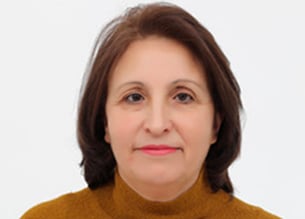Raja Ben Amar

Membrane : manufacturing technologies and applications
Raja Ben Amar is currently working as full Professor in the chemistry department of the Faculty of Science of Sfax, University of Sfax (Tunisia) and Director of the Reserach unit ‘Advanced Technologies for Environment and Smart Cities’. She achieved her master degree in Chemical Engineering from ENSIC (Institut National Polytechnique de Lorraine, France) and her PhD in chemical Engineering from IGC ( Institut National Polytechnique de Toulouse, France).
Her main research interests are in the area of membrane science and separation processes including wastewater treatment using hybrid processes, water desalination, development of low cost membranes from natural and hybrid materials. She has published more than 130 papers in ISI indexed journals, books and patents. She is a reviewer for several scientific journals. She is currently, the President of the African Membrane Society,
Program
I. Membrane from material to process
- Membrane preparation and fabrication methods
- Membrane structure and characterization techniques (porosity, pore size, filtration layer, surface functionality)
- Membrane transfer mechanism (according to the membrane structure and pore size)
II. Membrane processes and limitation in terms of permeate flux and solutes-membrane interactions:
Influence of the pore size and membrane structure (symmetric and asymmetric) and chemical composition (hydrophobic-hydrophilic, mineral-polymeric)
III. Membrane structure - Applications relationship :
- hydrophilic = aqueous filtration with pore size depending on the application (MF, UF, NF, RO)
- oil/water separation = hydrophobic
- food processing applications = ceramic membranes (sterilization, cleaning, ...)
- gaz filtration = hydrophobic (MF or UF for water solution degassing, membrane distillation) dense membrane for gaz separation
IV. New trends:
- Low-cost membrane fabrication and potential applications
- Membrane treatment for circular economic approach with a case study
